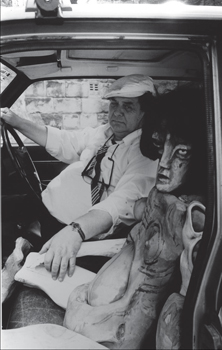Jeff Nuttall
Unique poet, writer, actor, jazz singer/player, painter, sculptor, teacher, critic, innovator and CND supporter, Jeff Nuttall, lectured at Bradford School of Art in the late 1960s and early 1970s.
 Jeff was the son of a headmaster, born in Clitheroe
in 1933. He studied at art schools in Hereford and
Bath before National Service in the Army. He then
worked as secondary school art teacher for 12 years
to 1968, although he was always involved in many
other activities. He played trumpet in a Soho club
and started a magazine My Own Mag of his writing
and art.
Jeff was the son of a headmaster, born in Clitheroe
in 1933. He studied at art schools in Hereford and
Bath before National Service in the Army. He then
worked as secondary school art teacher for 12 years
to 1968, although he was always involved in many
other activities. He played trumpet in a Soho club
and started a magazine My Own Mag of his writing
and art.
In 1966 he was one of the founders of the
performance art group The People Show with which
he travelled, wrote and acted for years. Jeff was one
of the pioneers of the improvised ‘happening’ later
recalled in Performance Art (1979).
Jeff then published the influential Bomb Culture (1968) in which he argued that living under the
threat of nuclear war had made young people
develop a counter culture, rejecting the values
of their parents’ generation.
He then taught at
Bradford Art School, then Leeds Polytechnic before
becoming Head of Fine Arts at Liverpool Polytechnic
until his early retirement in 1984.
He was then free to take various character roles
on TV, including; Chef, All Quiet On The Preston
Front and Men Behaving Badly and in film, notably;
Scandal, The World Is Not Enough and Robin Hood,
where he was a memorable Friar Tuck.
Jeff was also a highly regarded poet. In 1975
he became Chair of the National Poetry Society
and was the Poets’ Conference nominee for Poet
Laureate, although he was overlooked in favour of
Ted Hughes. He was poetry critic for the Guardian
and kept writing poetry, his final volume being
Selected Poems (2003).
He also continued to exhibit sculpture and paintings,
which were often outrageous and obscene. He
sincerely believed in the redemptive power of art to
free people from hypocrisy and complacency.
He wrote for various papers and magazines and
published over 40 books: of poetry, novels, a couple
of biographies, plus cultural analysis, latterly The
Pleasures of Necessity (1988) and Art and the
Degradation of Awareness (2001). He argued
that between 1966 and 1967 the revolution was
misappropriated by capitalism so poetry, art, jazz
and CND where reduced to just sex and drugs – that conscience and creativity were disarmed
by consumerism and celebrity culture. He railed
against cultural bankruptcy but was also known for
his cheerfulness, generosity and passion.
Jeff lived his life beyond full, cramming several
careers into his 70 years. He enjoyed life to the very
end, dying suddenly on his way back from the pub
where he had been playing a trad jazz gig with his
band in January 2004.
Photograph courtesy of Claire McNamee